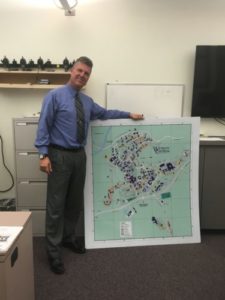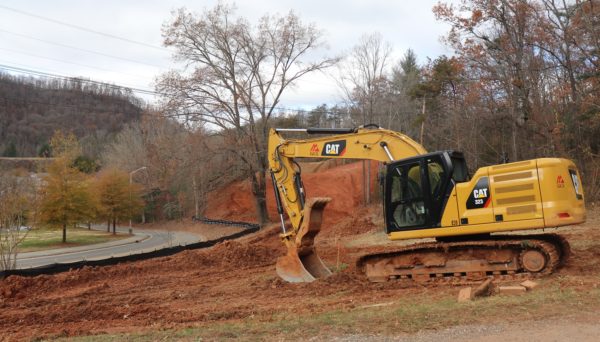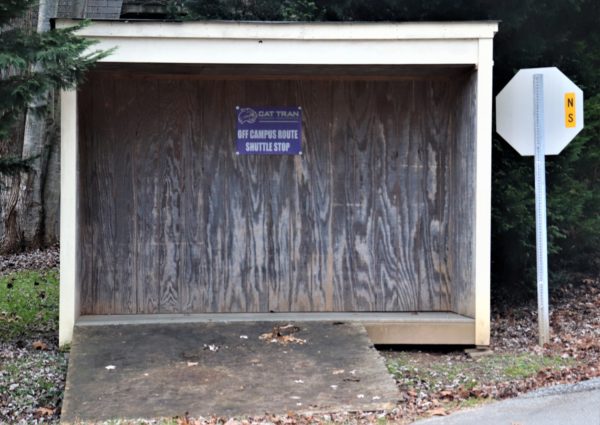
Fred Bauknecht, director of parking and transportation at WCU, poses with marked up parking map. Photo by Yustin Riopko.
WCUs increasing population has caused a need for additional parking lots including the university’s first parking garage. The WCU Board of Trustees approved the project back in Sept. 2017, after their first quarterly meeting of the 2017-18 academic year. Although construction has not started, the garage has a set location: Baseball Lot or how the administration likes to call it North Baseball Parking Deck.
“As soon as graduation is over they are going to close the ‘Baseball Lot’ for probably a year,” said Fredrick Bauknecht. This parking deck is the first one of three to be built.
Construction on the North Baseball Parking Deck was scheduled to start after December in 2018 graduation. However, due to a number of issues that have arisen, construction has been postponed for at least the next two months. The project’s timeline is being reevaluated and will be communicated within the coming weeks. Until then, the North Baseball Lot will remain as normal.
With the intended closure of the Baseball Lot’ causing commuters to lose 390 spaces this semester, Parking operations began construction on two additional commuter lots.

Beginning of construction on commuter lot by the Print Shop. Photo by Chandler Keller.
Additional Lots
Currently, WCU has broken ground on two additional commuter parking lots. One will be by the print shop and should consist of roughly 100-150 spaces. The other will be across the street from the Health and Human Services building and should consist of about 250 spaces. These two lots should be made available within the coming weeks. Although the lot by the print shop will be walkable, commuters will be forced to rely on the Cat-Tran to get to the main campus from the new lot by HHS.
This summer, a parking lot across the street from Judaculla Residence Hall will be built and will provide anywhere from 500-600 resident spaces. This parking lot should provide the 600 occupants of the new upper-campus dorm Levern Hamlin Allen, a place to park. Residential parking permits allow owners to park only in residential lots located near residential living areas. To go to class, residents are encouraged to use the Cat-Tran.
Cat-Tran Routes
Deserted Cat-Tran stations placed outside apartment complexes begs the question: Why can commuters not skip the drive and opt for the inevitable Cat-Tran ride? According to Bauknecht, when surrounding apartment complexes decided to “put up” Cat-Tran stations, WCU parking operations gave off-campus shuttling a try.

Deserted Shuttle Stop located outside The Villas apartment complex. Photo by Chandler Keller.
After a five-year trial, the cost of the Cat-Tran raised from $3-$4 per student to $30 per student. Since Parking Operations received no additional aid for the surrounding apartment complexes, they made the decision to cancel off-campus shuttling and use the additional shuttles to improve their on-campus shuttle system.
“Instead of waiting 15 mins per run, it’s now 10 mins per run,” Bauknecht stated, clarifying the new efficiency of the on-campus only shuttle system. The system provides the all-campus route, campus express, commuter express, village express and HHS express routes. Bauknecht also noted that with the 2020 plan, and parking lot expansions being focused on the perimeter of campus, it will be more efficient for the busses to stay on campus.
Although some WCU students feel the system still needs improvement, Hallie West, a WCU senior who relies on the Cat-Tran to shuttle her from the main campus to HHS, said that the wait time for busses sometimes is much longer than the 10 minutes Bauknecht gave. By the time it comes to her stop it is already too full so she has to wait for the next one.
With the growing community and the expanding campus, additional Cat-Tran busses could be beneficial but with the cost of operating one bus at $100,000, it would be a costly solution that the WCU community would pay for.
Funds
Since Parking Operations and Transportation receives no money from the state, it operates on funds collected from parking permit fees and meters. These fees run the parking department, enforcement department and pay for maintenance, like repainting the strips every year.
In 2017, the General Assembly approved a loan of $23.6 million for WCU to begin construction on the University’s first parking deck. The fees collected from permits and meters will additionally go towards repaying this loan and paying for the additional lots being constructed now.
Parking Operations, also, does not receive funds from ticket fines. Instead, 80% of the fees go to the local schools with the remaining 20% going towards helping pay for the parking enforcement officers.
“We’re the stewards of the money we collect from you guys, so we want to make sure it is used correctly,” said Bauknecht. If you feel the money you contribute is not being spent wisely, make sure to contact Parking Operations and let them know. If you would rather contribute your money elsewhere, make sure to check out these alternative routes.


